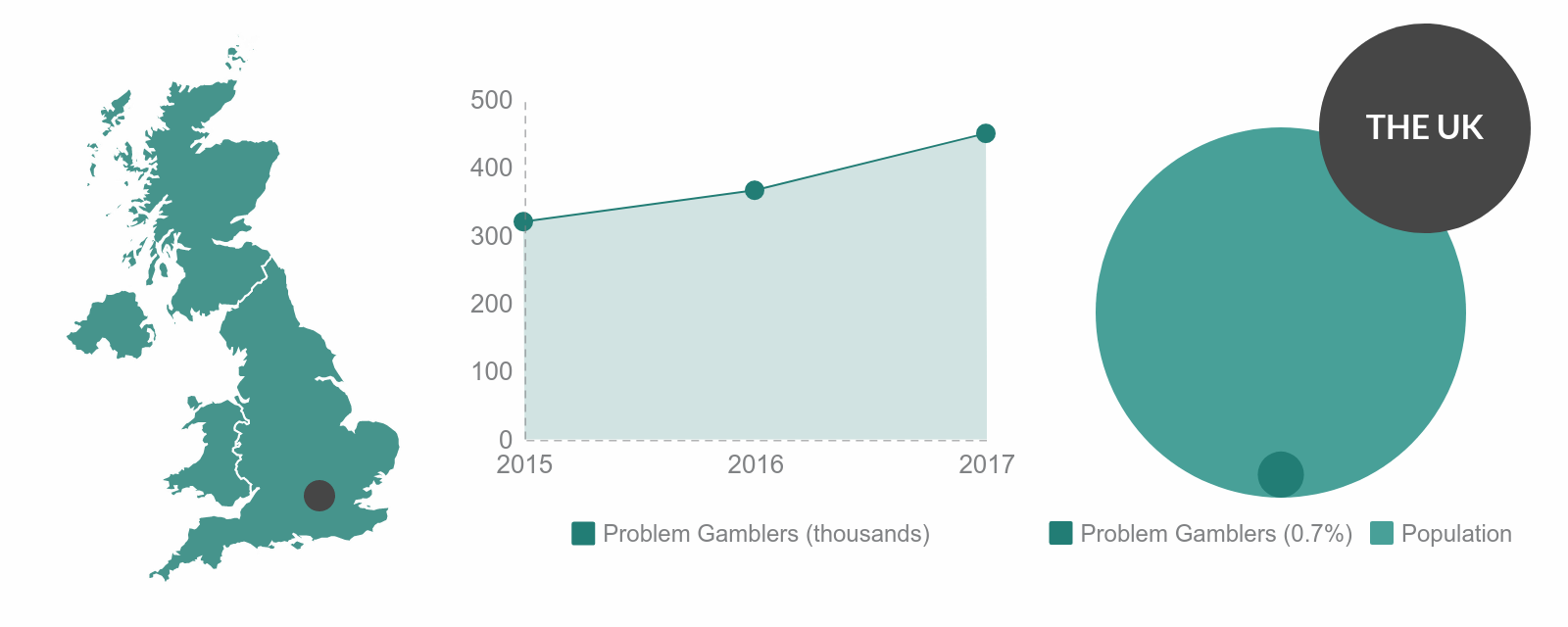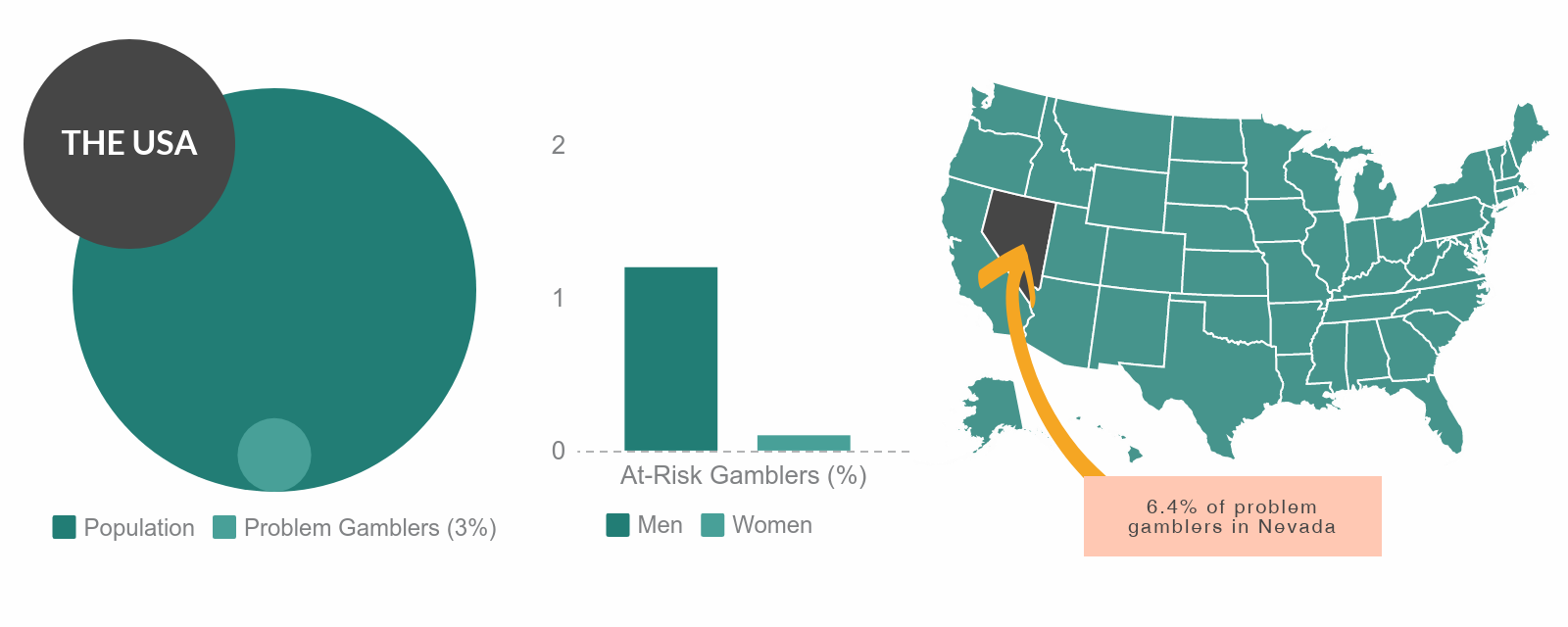Gambling addiction can strike any person who indulges in the habit. In one moment, the safe, fun-loving individual is coasting along nicely. In the next moment, they are betting more than they can reasonably afford and struggling to pay debts and basic bills.
Suffering from gaming addiction does not mean the person is weak-willed, but it can destroy the victim’s life and the lives of their family. Below, we will discuss the specifics of problem gambling including common signs and prevention.
Types of Gambling Addiction

Temporary: It happens because a person wants to avoid trouble in their life. Think of it as a dose of medicine they can receive over-the-counter with no professional input. Once the player feels better, they move on. People who play like this are known as risk-gamblers and may have problems with gambling over time.
 Chronic: When people consider gambling as the end-all solution to problems, chronic gambling addiction can occur. The afflicted cannot live without taking great risks and may put themselves into debt. Eventually, this can become a psychiatric disorder if not prevented or treated. Chronic gambling is the most dangerous form of betting.
Chronic: When people consider gambling as the end-all solution to problems, chronic gambling addiction can occur. The afflicted cannot live without taking great risks and may put themselves into debt. Eventually, this can become a psychiatric disorder if not prevented or treated. Chronic gambling is the most dangerous form of betting.
Problem Gambling Facts and Statistics
7 Signs of Gambling Addiction
 |
Lying. Those who have gambling addictions tend to compulsively lie. They will try to hide their activities from family, friends, coworkers, and even a spouse. |
|
 |
Chasing Losses. A popular mindset for gamblers is to get back their losses. This means that the more debt they accrue, the riskier their behavior becomes. When someone chases losses, often they pile up more debt than before. Itmeans that the more debt they accrue, the riskier their behavior becomes. |
|
|
|
|
|
 |
Obsession. When someone is addicted to gambling, they will not stop dreaming of the last time they were betting at a table. No reason is too slim to gamble. |
|
 |
Inability to Stop. Many gamblers are self-aware of these issues. Despite personal efforts, they succumb to the urge and continue to engage the addiction. |
|
 |
Gambling out of Necessity. Much like the withdrawal symptoms of drug and alcohol abuse, gamblers exhibit agitation, irritability, impatience, and a host of other issues when they stop gambling. Once they get their share of gaming in, they feel better. |
|
|
|
|
Possible Causes of This Disease
 There are many plausible causes for any case of gambling addiction. They include but are not limited to: family history of addiction, depression, anxiety and excessive stress. As logged by mental health professionals, addictions are often a method of self-medication. Below are several life events which can trigger an overindulgence in gambling.
There are many plausible causes for any case of gambling addiction. They include but are not limited to: family history of addiction, depression, anxiety and excessive stress. As logged by mental health professionals, addictions are often a method of self-medication. Below are several life events which can trigger an overindulgence in gambling.
Close Personal Loss. Traumatic experiences can be the cause of any addiction, gambling or otherwise. Players will flush out their minds with a fun, dopamine-filled activity to forget about a tragic event.
Stress at Home and Work. Professional or domestic stress can cause one to become addicted to gambling. Gamblers will take out their frustrations at the table rather than at the workplace or home.
A Considerable Win Early On. An addiction can be spurred by an early, lucky win. What was once a fun, lucrative pastime can turn into a debt-piling habit.
Debt. People are thrilled by the idea of hitting the jackpot. Financial issues could be solved with a million-dollar payout, but all too often players hurt themselves more than help.
Gambling Addiction Treatment
As with any other addiction, breaking the grapple gambling has over your life is not easy, but steps can be taken to do so. Seek help now. If you gamble compulsively or go on binges that quickly get out of hand, get assistance immediately.
Professional
There are many ways to seek professional help for a gambling addiction. It does not mean you are frail of body or mind, but these tools can help you get over the hurdle and provide for you a better life. Such tools are in the form of inpatient treatment programs, cognitive-behavioral therapy or basic marriage / financial counseling. Below are a few institutions which are dedicated to, one way or another, ridding the addiction from society.
 Algamus Treatment Programs (US). Located in Arizona, the Algamus Association offers a 12-step treatment service to individuals plagued by compulsive betting. There clients
Algamus Treatment Programs (US). Located in Arizona, the Algamus Association offers a 12-step treatment service to individuals plagued by compulsive betting. There clients
 Gamblers Anonymous. A group of people who are connected by a common experience. All help received is confidential and free. The only prerequisite is a willingness to stop gambling. Contact them to find a free support group near you.
Gamblers Anonymous. A group of people who are connected by a common experience. All help received is confidential and free. The only prerequisite is a willingness to stop gambling. Contact them to find a free support group near you.
 National Problem Gambling Clinic (UK). Located in London, England, the NPGC aims to treat addicted gamblers within the country. They offer psychological care, support groups, medication and a host of different treatments to patients.
National Problem Gambling Clinic (UK). Located in London, England, the NPGC aims to treat addicted gamblers within the country. They offer psychological care, support groups, medication and a host of different treatments to patients.
 Canadian Centre on Substance Use and Addiction. This association is the official organization created by Parliament to curb gambling addiction. They provide leadership, guidance, research and act as a font of knowledge on the subject.
Canadian Centre on Substance Use and Addiction. This association is the official organization created by Parliament to curb gambling addiction. They provide leadership, guidance, research and act as a font of knowledge on the subject.
Also, there are several companies that are willing to provide help to addictive gamblers. Their hotlines, live chats, forums are open 24/7. Here are some of them: GamCare, BeGambleAware. Besides addicted players can find some relevant help from such regulative organizations as eCOGRA, UK Gambling Commission, IGC, RGA, MGA, Responsible Gambling Council, and others.
Self-Help
 Self-help is often the best way to receive aid. Admitting there is a problem and being driven to cease problematic behavior should be your first goal. After that, you can try some of these techniques to cure your addiction.
Self-help is often the best way to receive aid. Admitting there is a problem and being driven to cease problematic behavior should be your first goal. After that, you can try some of these techniques to cure your addiction.
Seek psychological help. Depression, stress and anxiety are all triggers for gambling problems. What’s worse is that the addiction can make compound these issues, making everything worse. Consider talking to a psychologist or attending a group therapy session.
Get a support network. Talk with others. The family is always a good place to start, but making new friends is paramount in the healing experience. Reach out to colleagues or friends, and try to volunteer to meet new people.
Relieve stress in a healthy way. Gambling is one way to reduce stress, but it feeds into your addiction. There are more effective methods, such as meditation or other forms of relaxation. Working out by running, performing yoga, etc. also can help to relieve unpleasant feelings in a safe environment.
Preventing Problem Gambling
Certain groups of people are more at-risk than others. To be safe, you should have a solid understanding of which groups are more likely to partake in gambling and by extension become addicted.
Who is at Risk?
 Males, particularly ages 18-24. Young men are the most common types of people with gambling issues across the world. Online gambling has attracted this group in herds. So they should be aware of all possible risks.
Males, particularly ages 18-24. Young men are the most common types of people with gambling issues across the world. Online gambling has attracted this group in herds. So they should be aware of all possible risks.
 Those with impulsive natures and compulsive attitudes. Some people are genetically predisposed to decide on impulses to seek instant gratification. This may be inflated by an immediate reward culture, but studies suggest some brains are more at-risk than others.
Those with impulsive natures and compulsive attitudes. Some people are genetically predisposed to decide on impulses to seek instant gratification. This may be inflated by an immediate reward culture, but studies suggest some brains are more at-risk than others.
 People with lower serotonin levels. Some individuals derive less enjoyment from everyday activities than most people. This lower baseline, known as anhedonia in medical circles, could cause the individual to seek more exciting events such as high-risk gambling.
People with lower serotonin levels. Some individuals derive less enjoyment from everyday activities than most people. This lower baseline, known as anhedonia in medical circles, could cause the individual to seek more exciting events such as high-risk gambling.
 Those who don’t consider long-term consequences. Gambling is an immediate action with immediate rewards and detractors. But gambling too much can cause financial harm years down the road. Those who don’t consider the long-term effects of their actions are more likely to engage in risky behavior.
Those who don’t consider long-term consequences. Gambling is an immediate action with immediate rewards and detractors. But gambling too much can cause financial harm years down the road. Those who don’t consider the long-term effects of their actions are more likely to engage in risky behavior.
Safety Precautions
![]() To be aware means to be safe. Learn more about gambling from different places and sources.
To be aware means to be safe. Learn more about gambling from different places and sources.
![]() Be sure that you know symptoms of addiction and check yourself and those in your life for the signs.
Be sure that you know symptoms of addiction and check yourself and those in your life for the signs.
![]() Attend presentations designed to educate people on the subject.
Attend presentations designed to educate people on the subject.
![]() Consider playing a role in policy support for gambling addicts.
Consider playing a role in policy support for gambling addicts.
![]() Most of all, listen to those around you and help those who seem like they may be struggling with gaming, no matter how desperate they are.
Most of all, listen to those around you and help those who seem like they may be struggling with gaming, no matter how desperate they are.
![]() And for yourself, always remember to gamble responsibly.
And for yourself, always remember to gamble responsibly.
Responsible Gambling
 Usually, all casinos are committed to responsible gaming. They want players to enjoy their visit to the betting house. Staying composed and managing the player’s gambling behavior will enable players to enjoy the experience the website.
Usually, all casinos are committed to responsible gaming. They want players to enjoy their visit to the betting house. Staying composed and managing the player’s gambling behavior will enable players to enjoy the experience the website.
If at any point gambling stops being fun, causes some difficulties or gamblers think they are at risk of developing a gambling problem — it’s best to contact the casino service. Responsible gambling is supported by two parties: the casino and the player’s themselves.
Betting Responsibly
Gamblers should remember:
- Gambling is entertainment. You win some, you lose some. Treat the money you spend at a casino as an expense rather than an investment.
- Don’t gamble if you can’t afford to lose. Winning will be fun, but losing won’t be catastrophic.
- Take breaks. The more you play, the more your judgment will begin to slip and you’ll make poor decisions.
- Never handle money when emotional, as this could impact your better judgment.
- Walk away when you’ve lost. Chasing a loss can mean even greater debts.
- Set limits and stick to them. Doing so means you are in control of your gambling activities and your life.
Limiting Tools
Casinos provide several tools to help players stay in control of their gambling:
![]() Deposit limits. All casinos can place deposit limits for any player who requests it. You may only deposit $1,000 per month and the institution has a moral obligation to disallow the further credit.
Deposit limits. All casinos can place deposit limits for any player who requests it. You may only deposit $1,000 per month and the institution has a moral obligation to disallow the further credit.
![]() Breaks. A casino may impose that you stop gambling for a period of time (~1 day to 1 month) at their discretion. This is similar to a bartender no longer serving an over indulging customer.
Breaks. A casino may impose that you stop gambling for a period of time (~1 day to 1 month) at their discretion. This is similar to a bartender no longer serving an over indulging customer.
![]() Consultation. Many physical casinos offer a consultation service to bring the gambler back to reality. They will get a sense of your finances and if you can afford to actually be gambling.
Consultation. Many physical casinos offer a consultation service to bring the gambler back to reality. They will get a sense of your finances and if you can afford to actually be gambling.
![]() Self-exclusion. In bad cases, a casino may ban a gambler for years as to not enable their addiction.
Self-exclusion. In bad cases, a casino may ban a gambler for years as to not enable their addiction.
Conclusions
If there’s anything to take away from this article, it’s that while taking a risk can be a fun night out, prolonged gambling can also trigger a more sinister addiction. Gambling excessively has been known to cause:
- Disappointment
- Stress
- Financial Hardship
- Domestic and Professional Issues
- Obsession
If you or a loved one suffers from this disease, there are resources which include hotlines, support groups, medication, therapy and much more to assist the individual in recovery. Take advantage of these services whenever possible, but the best method is to curb addiction before it occurs. As always, play responsibly at both land-based and virtual casinos. Have fun, but know when to quit.







